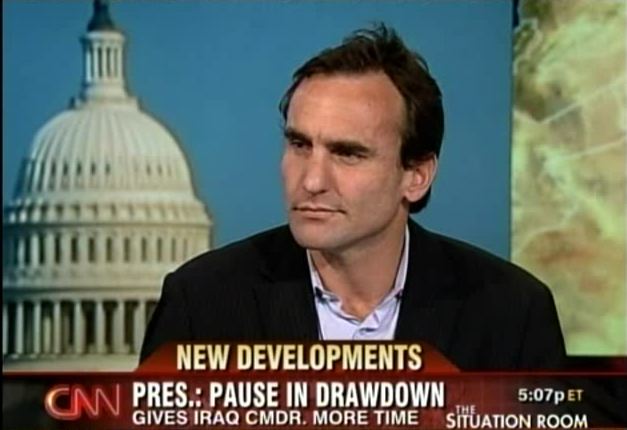TSR: "This is your ally."

Length: 3:58
LARGE (46.5 MB) ----- SMALL (4.8 MB)
Michael is in The Sit Room and talks to Wolf about the Iranian "agents of influence" in the Iraqi government.
WOLF BLITZER: So what changes will the president's statement on the troops bring about actually on the ground?
Let's bring in our own Michael Ware. He's here in Washington. He's covered the war right from day one, mostly in Iraq, but now here in Washington.
You had a chance to speak with General Petraeus. You sat down with him earlier today. First of all, let me get your reaction to what we just heard from General Powell, that the U.S. military won't be able to sustain, let's say 140,000 troops in Iraq, for a whole lot of time given the other requirements in Afghanistan and elsewhere.
MICHAEL WARE, CNN CORRESPONDENT: Well, obviously, I don't have the global perspective or the at home perspective of exactly the status of U.S. forces. But I can tell you now, General Powell might be right. The problem is in a year from now, you might still need 140,000 troops. So you may end up finding yourself between a rock and a hard place. One hopes that you don't find yourself there.
Let's hope that Iraq is not in the situation that it is in now, that the messy status quo that Senator Obama was pitching for, perhaps even that might emerge, because right now, there's no promise of anything -- Wolf.
BLITZER: All right. You sat down with General Petraeus earlier today here in Washington. I'm going to play a little clip of this exchange you had with him.
Listen to this.
(BEGIN VIDEO CLIP)
WARE: You would know, as well, that many of your intelligence agencies say Iranian agents have influence stretched to the highest levels of the Iraqi government. We've seen the interdiction by the president of Iraq during the detentions of some of the Quds Force operatives.
GENERAL DAVID PETRAEUS, COMMANDER, MULTI-NATIONAL FORCE-IRAQ: Yes. And the...
WARE: Does that concern you?
PETRAEUS: Again, it's a reality. And it is...
WARE: That there is that kind of infiltration in...
PETRAEUS: It's a reality. Again, look, as you pointed out earlier -- but, again, for the listeners, your audience -- these parties are products, many of them, of time in Iran. It's where a number of the current Iraqi leaders spent their time in exile, where they went when pursued by Saddam's army or his thugs. So a lot of that is understandable. And, again, it is a reality. And it's something that just has to be dealt with.
(END VIDEO CLIP)
BLITZER: Let's be precise, Michael, what that reality is, based on the intelligence sources you're talking about, because I've heard the same thing from others, that among the highest levels of the Iraqi government -- ministers in the cabinet and elsewhere -- what they're suggesting is that a lot of these people, at least some of these people are, what, agents of the Iranian regime of President Ahmadinejad?
WARE: Absolutely. And certainly in terms of agents of influence.
Now, do they follow Tehran's dictates?
Not necessarily. It's kind of like saying Muqtada al-Sadr, the head of the Mahdi Army, he has a relationship with the Iranians, but it's very complex. He takes their money, but doesn't quite take their orders.
So these are very complicated relationships. But, yes, from the president of Iraq on down, the building blocks of this so-called ally, the Iraqi government, come from parties that have ongoing connections to Iran. And it spreads throughout the political structure. The head of the Constitution Committee, the head of their Armed Services Committee, the head of the Parliamentary Overwatch Committee, these are all people from parties that were built in Iran, sheltered by Iran or are funded by Iran. This is your ally.
BLITZER: This is -- well, yes, it's a tough crowd out there, Michael.
I know you're going to have a lot more of your interview coming up later tonight on "ANDERSON COOPER 360."
Michael Ware is here in Washington. Good work today, as usual.
Let's go to Jack Cafferty. He's got "The Cafferty File."
That's pretty shocking stuff, Jack, when you think about it, that some of these Iraqi leaders are really agents of influence of the Iranian government.
JACK CAFFERTY, CNN ANCHOR: Well, what's more shocking is that Michael Ware is not the only one who knows that. There are people in Washington in the intelligence agencies, and probably in the White House, that know it, too. And nothing's being done about it. That's the real sad part.
